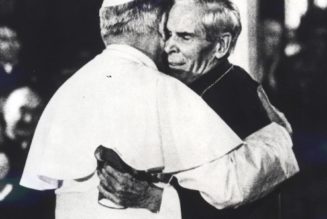
“And when I am lifted up from the earth, I will draw everyone to myself.” (John 12:32)
St. Augustine wrote “Pondus meum amor meus,” which means, “My weight is my love.” In other words, our love is what draws us to something. We bear a certain heaviness (gravitas) towards the things that we love.
As a physics teacher, this brings to mind what I know about gravitation and all kinds of analogies begin to fall into place, as if the mass of one idea is enough to draw similar ideas to itself.
But are these analogies valid? Is the similarity between weight and love only the result of an overactive imagination, or is love somehow the meaning of weight?
Thankfully, I am not the only person to have asked this question or come to the following conclusion: our physical universe means more than itself.
In his Love of God, Reginald Garrigou-Lagrange wrote, “The modern world sees the law of universal attraction only in its material and inferior aspect in the order of inanimate bodies; we dare look at its full beauty. To the modern philosopher the material world may be only a condition for the development of consciousness; for St. Augustine and St. Thomas, and for us, it is a mirror truly though imperfectly reflecting the perfections of the spiritual order.” He goes on to note that the angels learn about the physical world through spiritual things; but we learn about spiritual things through the physical world.
And so the analogies that exist between gravitation and love (as well as all the other physical analogies and symbols so loved by spiritual writers) are valid and important for revealing truths about spiritual matters.
When it comes to massive objects and movement, there are a couple of principles involved: the more massive the object, the greater the force it exerts on other objects. Also, the force of gravitation between two objects is shared; as much as the earth pulls on a stone, so much the stone also pulls on the earth. The stone moves more than the earth because it is so small.
The meaning?
The more we love God, the more “massive” he is to us. As our love for God grows, so does the amount we are drawn to him. Not only that, but the love is shared. Our love for God is one with God’s love for us. Our love for him does not exist on its own and does not generate itself. God being infinitely loveable and infinitely massive according to the analogy, all the movement is on our part as we draw closer to him. He is immovable.
Here the analogy breaks down because God’s love for us is far greater than our paltry love for him, and his love originates ours.
There is more.
Referring to Aquinas, Garrigou-Lagrange wrote, “A stone falls faster and faster as it nears the earth; so should our souls advance more and more quickly towards God as they draw nearer to Him and are increasingly attracted by Him.”
The longer something is in a state of falling, the faster and faster it goes. This is why there are shooting stars. Those space pebbles have been falling for so long toward the earth that they burn up from friction with the air because of their speed. Also, the closer and closer they get to the Earth, the stronger the pull. The closer we get to God, the more attractive he is to us.
Why is it, then, that many do not feel attracted to God? He is most lovable and so most attractive, so why the indifference many feel towards him? For the same reason we are not pulled straight into the sun. We are attached to the earth and are content to remain in orbit, at a distance, weighted to a lesser sphere. Even a black hole cannot pull to itself what is in a stable orbit or moving away fast enough.
But, like a black hole, the closer we get to God, the more time slows down. Earthly relevance fades away. As objects move faster and faster, time also slows down. This double slowing of time reveals why, perhaps, some saints lived such short lives. Their proximity to God and their velocity toward him stretched the spiritual magnitude of each moment. According to our clocks, their life was short, but Heaven’s clock is not set by worldly motions. The heart of God is timeless on account of the immensity of this love, infinite in magnitude because he is Love Itself.
The black hole analogy goes on, too. There is no seeing past the event horizon of a black hole. So we cannot see God directly. Lagrange: “The good hidden in this divine obscurity lies out of the reach of our understanding, but supernatural love makes us taste and see that it is good.” We walk by faith, not by sight, and the natural result of true faith is love. If we can walk by faith, it is because we are pulled in the right direction by the pleasant heaviness of love.
Join Our Telegram Group : Salvation & Prosperity







